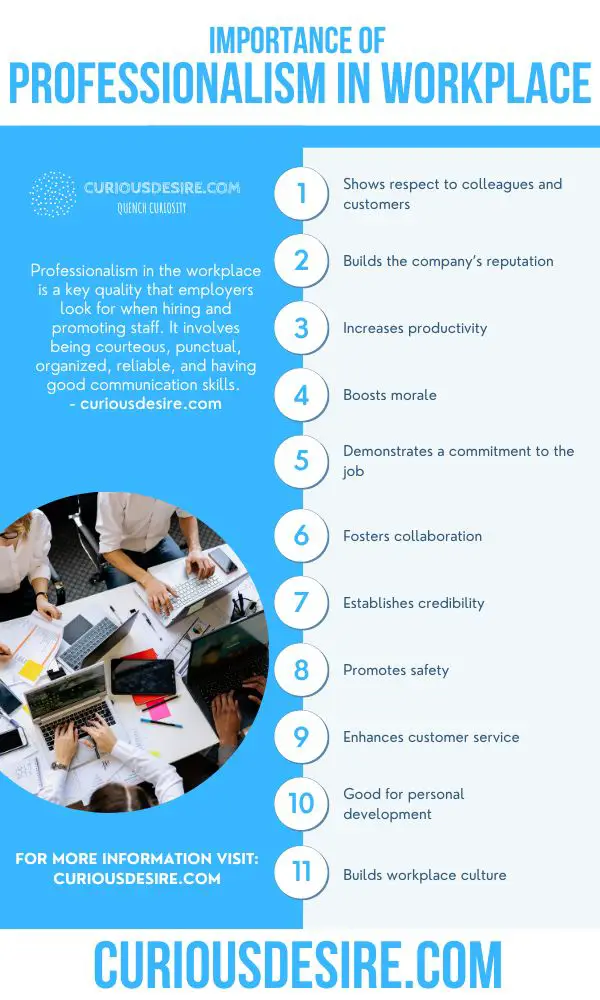Professionalism in the workplace is a key quality that employers look for when hiring and promoting staff. It involves being courteous, punctual, organized, reliable, and having good communication skills.
Professionalism is a key factor in creating a cohesive and productive work environment that facilitates collaboration. In this article, we’ll discuss the importance of professionalism in the workplace.
15 Benefits of Professionalism in the Workplace
In the workplace, professionalism is important for many reasons, including the following:
1. Professionalism shows respect to colleagues and customers
Respectful behaviour sets a tone of cooperation and mutual understanding, which help create an environment where people can work together towards shared goals.
When employees are respectful to their colleagues and customers, it creates trust and promotes effective communication. For instance, employees who use polite language, treat others with kindness and respect, and are mindful of their body language can help create a more positive work environment.

2. Professionalism builds the company’s reputation
The way employees interact with customers in the workplace has an impact on how customers perceive the business as a whole. When employees are professional and courteous, it reflects positively on the company’s brand and reputation.
Through professionalism, employees can help build a strong and positive corporate image that will attract potential customers and investors.
3. Professionalism increases productivity
Employees who practice professionalism in the workplace tend to be more productive because they are organized and take their work seriously. Their focus on getting results creates an atmosphere of accountability, which helps motivate people to do their best work.
Organized employees also tend to be better at problem-solving and have a more efficient approach to tackling tasks. This can lead to higher output, faster project completion times, and improved customer satisfaction.
4. Professionalism boosts morale
When colleagues practice professionalism in the workplace, it boosts morale and encourages collaboration. Respectful behaviour and positive interactions create an atmosphere of mutual support and respect, which can help boost team spirit.
A strong sense of camaraderie increases motivation and creates a pleasant work environment that people look forward to coming into each day.
5. Professionalism improves communication
Professionalism encourages clear and effective communication between colleagues. It involves being respectful and mindful of the way we talk to each other, as well as making sure that messages are delivered in an appropriate manner.
This helps ensure that important information is communicated effectively and reduces the chances of misunderstanding or confusion. Professionalism also helps ensure that people are speaking to each other honestly and openly, which can help increase trust between colleagues.
Suggested Readings
Why professionalism is important?
Importance of professionalism in business
Importance of professionalism in healthcare
6. Professionalism demonstrates a commitment to the job
When employees demonstrate professionalism in the workplace, it shows that they are committed to their work and take their responsibilities seriously. This helps build a sense of trust with employers, as well as making sure that everyone is working together towards common goals.
Additionally, professionalism helps ensure that everyone is on the same page, which can help reduce delays and increase efficiency.
7. Professionalism fosters collaboration
When employees are professional in the workplace, it encourages a sense of collaboration between colleagues.
People are more likely to trust each other and work together when they know that their co-workers practice professionalism. This can lead to more creativity and innovation, as well as greater productivity.
For instance, when everyone is respectful and polite to each other, it can create an atmosphere of collaboration and teamwork which can help encourage new ideas and solutions.

8. Professionalism establishes credibility
When employees demonstrate professionalism in the workplace, it reflects positively on both the individual and their employer. It shows that an employee is reliable and can be trusted with tasks and responsibilities.
Professionalism also builds a good reputation for an organization, which can help attract customers or business partners. For example, a well-trained and professional staff usually creates a good impression, which can lead to more customers or investors.
9. Professionalism promotes safety
Professionalism in the workplace can help promote safety. By adhering to professional standards and taking safety protocols seriously, employees can help reduce the risk of accidents or injuries in the workplace.
A safe working environment helps ensure that everyone is able to work without fear of harm, which can lead to greater job satisfaction and improved morale. For instance, consistent use of personal protective equipment (PPE) can help reduce the risk of occupational hazards and illness.
10. Professionalism enhances customer service
Professionalism in the workplace also helps ensure that customers are getting the best possible experience. It involves being courteous and knowledgeable when dealing with customers, as well as taking care to meet their needs.
This can help create a positive impression and ensure that customers come back, as well as create goodwill between the organization and its patrons. Professionalism also helps build trust with customers, which can lead to more successful business relationships in the long run.
11. Professionalism is good for personal development
Professionalism in the workplace can be beneficial for individual growth and development. It encourages employees to think critically and take responsibility for their actions, which can help them become more successful over time.
Professionalism also helps foster a sense of pride in one’s work, which can lead to improved job satisfaction and a more positive attitude in the workplace. Finally, proper professionals can help employees build their confidence and gain the respect of their peers.
12. Professionalism builds workplace culture
Professionalism in the workplace can help create a sense of unity and togetherness between employees. It helps foster respect, collaboration, and camaraderie among employees, which can lead to better morale and improved performance.
Moreover, professionalism also helps build a strong organizational culture that is based on mutual trust and respect. This can create a positive working environment where employees feel valued and appreciated, which can lead to higher productivity.
13. Professionalism helps build relationships
Professional conduct in the workplace can help employees build strong working relationships. Demonstrating respect and courtesy to colleagues, it encourages others to do the same and fosters a sense of collaboration and trust among coworkers. This is important as it helps create an environment where everyone works together for common goals, which can ultimately lead to greater success.
In addition, professionalism can also help foster healthy relationships with customers and business partners. It shows that an organization is committed to providing quality service and building mutually beneficial partnerships.

14. Professionalism helps with problem-solving
Professionalism in the workplace can be helpful when dealing with difficult situations. By maintaining a professional attitude, employees can better handle conflicts and use critical thinking to come up with solutions. This helps create an environment of productive problem-solving, which is essential for any organization.
Furthermore, professionalism also encourages open communication by creating a safe space to share ideas and voice concerns. This helps ensure that everyone is heard and can help lead to more successful outcomes.
Suggested Readings
importance of professionalism in teaching
Importance of professionalism essay
15. Professionalism is essential for success
In the end, professionalism in the workplace is essential for any organization that wants to succeed. It helps create a positive working environment, encourages customer loyalty, fosters strong relationships between employees and customers, and provides an important foundation for problem-solving.
By cultivating a culture of professionalism in the workplace, organizations can ensure that employees are motivated and productive, customers are satisfied with their experience, and business goals are achieved. Professionalism is an important part of any successful organization and should be prioritized for lasting success.
Conclusion
Professionalism is an important part of any successful organization. It helps build trust and loyalty with customers, encourages personal growth in employees, fosters strong workplace culture, builds relationships between coworkers and customers, and facilitates problem-solving.
By cultivating a culture of professionalism in the workplace, organizations can ensure that their goals are met, and success is achieved.
Relevant Articles
Why professionalism is important?
Importance of professionalism in business
Importance of professionalism in healthcare